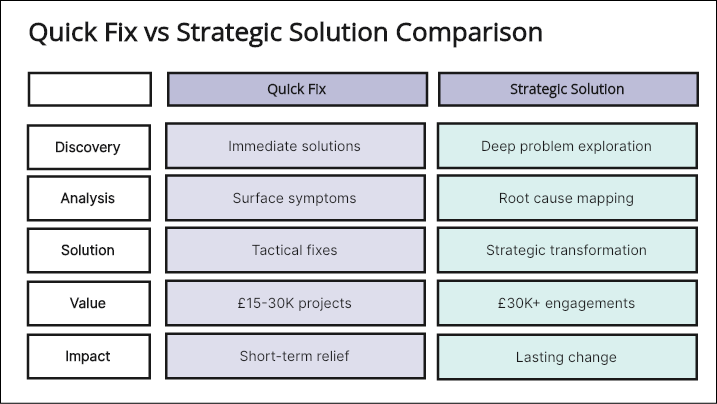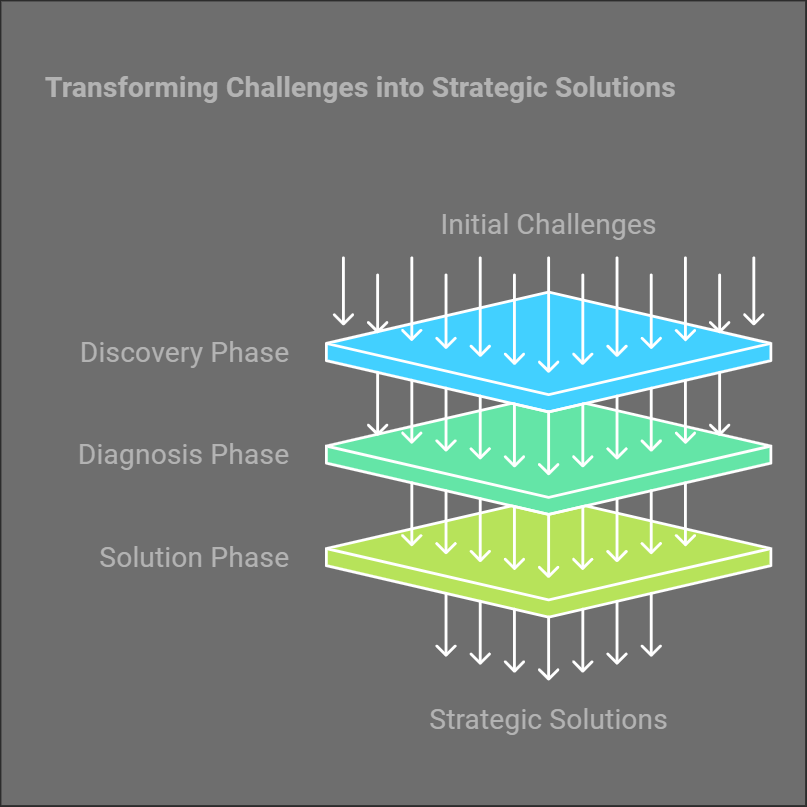Are you solving problems too early in your consulting process?
Here's a truth that might make you uncomfortable: Your hard-earned expertise could be sabotaging your consulting practice.
In fact, I'll take it a step further – the better you are at solving problems, the more likely you're undervaluing your services.
And it's costing you more than you think.
You know the moment I'm talking about.
You're on a discovery call, and within minutes, you've already diagnosed the client's core issues. Your mind races with solutions. Maybe you even feel a hint of pride at how quickly you can spot what others miss.
Then, wanting to demonstrate value (and perhaps justify your fees), you share these insights.
The client is impressed.
They take notes eagerly.
They thank you profusely.
And then they never hire you.
This pattern is so prevalent in consulting that I've started calling it the "expertise trap" – where your ability to quickly solve problems actually prevents you from landing transformative engagements.
Let me show you exactly what this looks like in practice:
This stark contrast reveals why seasoned consultants often struggle to scale beyond mid-sized engagements. The left column represents the path of least resistance – the one that feels productive but ultimately caps your value.
The right column?
That's where transformation happens.
Here's why this matters:
When you solve problems too early, you:
Address symptoms instead of root causes
Miss critical context that could lead to larger engagements
Position yourself as a tactical executor rather than a strategic advisor
Let me share a story that illustrates this:
Sarah, a process improvement consultant, was approached by a manufacturing client about their quality control issues. In her first meeting, she immediately identified three quick fixes that could improve their metrics. She shared these solutions, thinking it would demonstrate her expertise and add value.
The result?
The client implemented her suggestions internally and never hired her.
Six months later, she discovered the company had hired a competitor for a £180,000 transformation project.
Why?
Because that consultant spent the discovery process understanding how the symptoms connected to their market position, customer retention, and growth strategy.
The Truth About Problem-Solving Timing:
Early Solutions Diminish Perceived Value
When you solve problems in discovery, you become a source of information rather than transformation
Clients value diagnosis more than quick fixes
Quick solutions suggest simple problems, leading to smaller engagements
The Expertise Paradox
The more expert you are, the faster you spot solutions
The faster you spot solutions, the more you need to restrain yourself
The ability to delay solutions often correlates with higher fees
The Strategic Alternative Instead of solving problems early:
Focus on problem exploration
Map implications and connections
Build strategic context
Quantify business impact
Create solution frameworks (not specific solutions)
The Action Framework:
Discovery Phase
Ask questions about impact rather than implementation
Focus on "why" before "how"
Document interconnections between symptoms
Diagnosis Phase
Present problem patterns rather than solutions
Quantify cost of inaction
Map problem ecosystem
Solution Phase
Only after engagement
Comprehensive rather than piecemeal
Strategic rather than tactical
Implementation Guidance:
Create a "Solution Embargo" for your discovery process:
No specific solutions in first one or two client conversations
Replace solution statements with diagnostic questions
Focus on impact metrics over implementation details
The Counterintuitive Truth: The longer you wait to present solutions, the more valuable those solutions become.
Remember: Your expertise is most valuable when it's applied at the right moment in the process.
Early solutions might feel helpful, but they often prevent you from accessing larger, more strategic engagements.
—
Recognise these patterns in your consulting practice?
Let's have a focused conversation about transforming quick fixes into strategic engagements with your clients. Speak to me here to explore how your expertise could be commanding premium fees.







